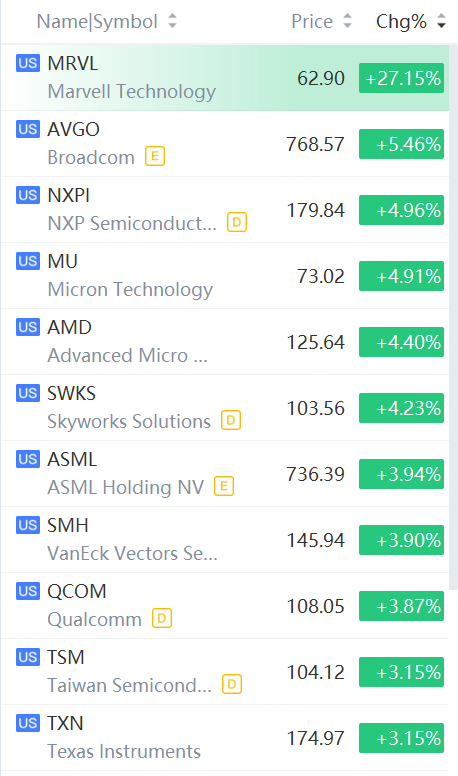Semiconductor shares gained in morning trading.
Marvell Technology Inc on Thursday forecast its artificial intelligence revenue would double for the year, after the chipmaker surpassed Wall Street targets for first-quarter revenue.
Its shares rose over 27% in morning trading, as Marvell became the second U.S. chipmaker in as many days to hitch its wagon to the boom in AI demand.
Broadcom rose 5.46%; NXPI, Micron, AMD, SKWS rose over 4%; ASML, SMH, Qualcomm, TSM, TXN rose over 3%.
Larger peer Nvidia on Wednesday announced a second-quarter revenue target more than 50% above market estimates, with plans to boost supply to meet surging demand for its AI chips.
"We are forecasting our AI revenue in fiscal 2024 to at least double from the prior year and continue to grow rapidly in the coming years," said Marvell CEO Matt Murphy.
The California-based firm also forecast second-quarter revenue of $1.33 billion, above analysts' estimates of $1.31 billion, according to Refinitiv data.
Excluding items, it reported revenue of $1.32 billion for the quarter ended April 29, beating expectations of $1.30 billion.
Nvidia forecast current-quarter revenue of $11 billion, plus or minus 2%. Analysts polled by Refinitiv are expecting revenue of $7.15 billion.
"Given the generative AI gold rush taking place, this should fuel demand for Nvidia's chips for the remainder of the year," said Edward Jones analyst Logan Purk.
Nvidia did not provide a full-year forecast on Wednesday, but Chief Financial Officer Colette Kress said the company had procured "substantially higher supply" for the second half of the year.
Adjusted revenue for the quarter ended April 30 was $7.19 billion. Analysts polled by Refinitiv were expecting revenue of $6.52 billion. The company's data center chip sales hit $4.28 billion, beating analyst estimates of $3.89 billion, according to segment data from FactSet.
Gaming chip revenue beat Wall Street expectations at $2.24 billion versus estimates of $1.97 billion, according to FactSet data.
Net income rose to $2.04 billion, or 82 cents per share, from $1.62 billion, or 64 cents per share, a year earlier. Excluding items, the company earned $1.09 per share in the first quarter, beating estimates of 92 cents.

